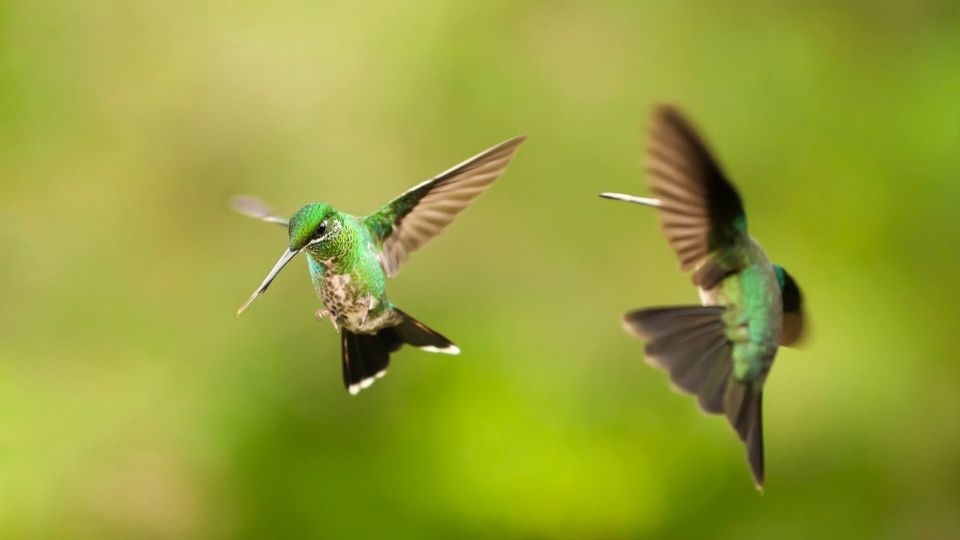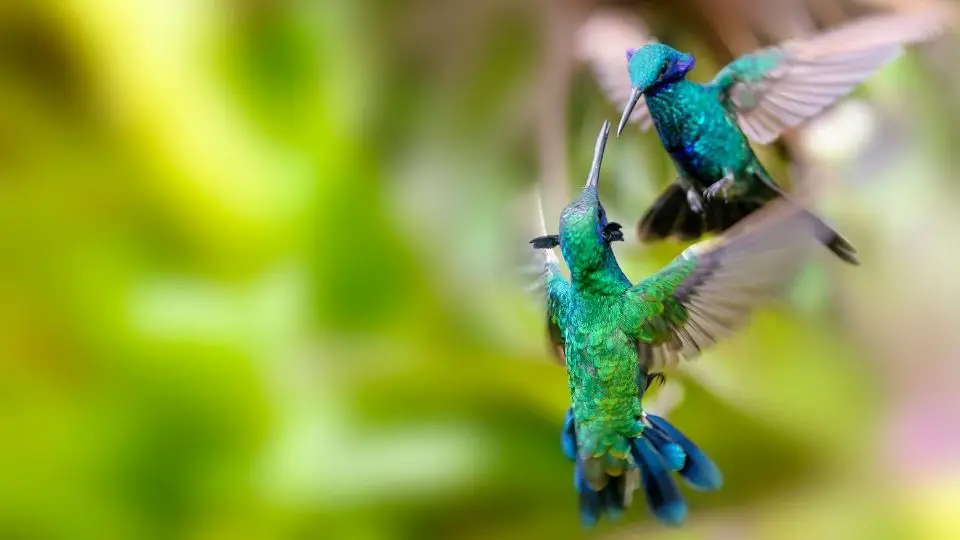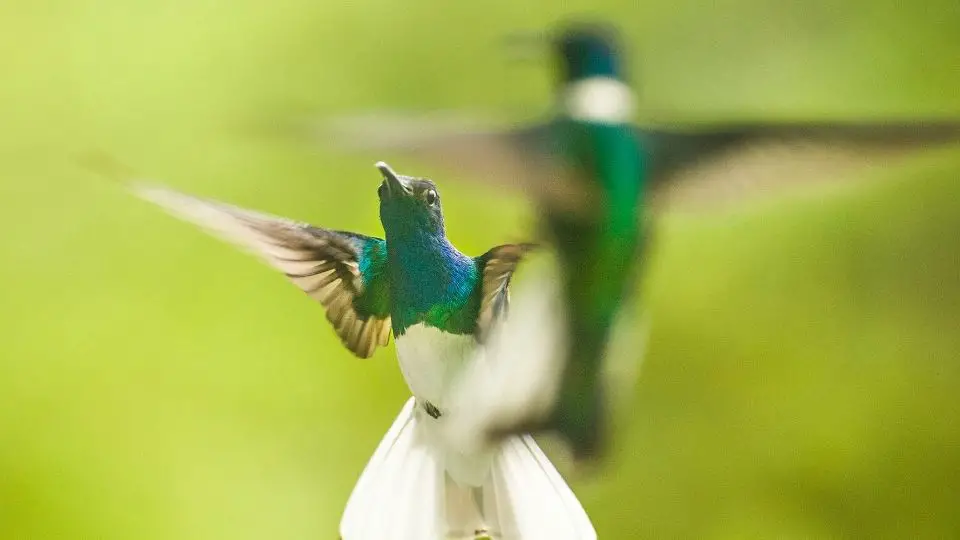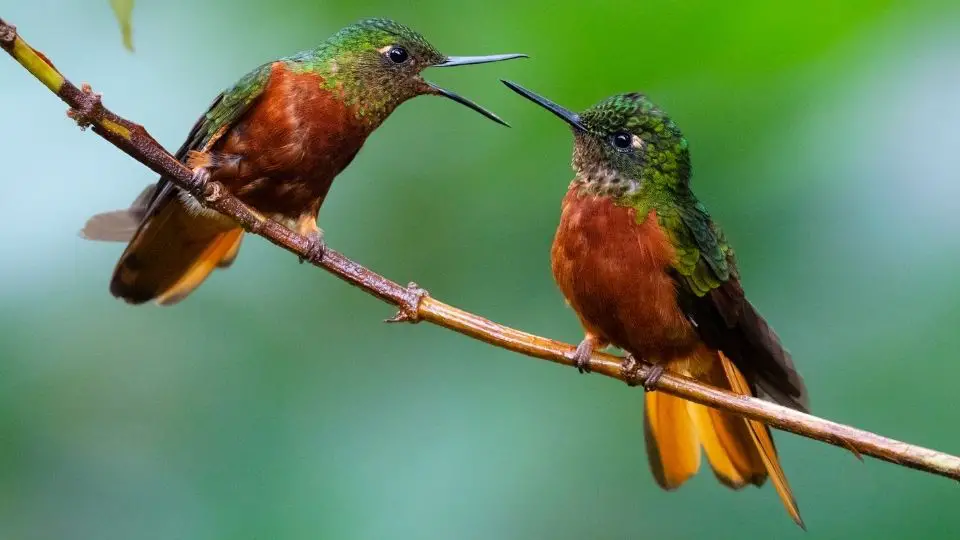Hummingbirds will fight each other for territory, food, and a mate. Luckily, they usually don't end up severely injured and only lose a feather or two in a fight.
Hummingbirds are territorial by nature (surprise, surprise), especially in the breeding season, which is from March to September. But fighting also happens when there are more hummingbirds than space available. It’s normal for them to fight, so you have to make sure to protect the space around your feeders, for their sake.
Hummingbirds fight because they are competitive – but aggressive hummingbirds have a reason to be so. When food sources are scarce and too many hummingbirds abound, there is likely to be a fight. The dominant hummingbird ends up winning the battle in the end. They will use their beaks and claws as weapons. But before doing that, they will warn others by chirping.
Hummingbird fights are spectacular and entertaining, but not if your goal is to have a quiet session of napping in the sun while they visit. When do they visit? In North America and South America, hummingbirds are likely to be seen during the summer months, but in the winter, they will migrate to Central America and Mexico.

Table of Contents
Hummingbird behavior
Hummingbirds are not very social creatures – they are usually solo migrants, are wary of human presence, and don’t value cooperation as much as other bird species. They can scare off easily, so you have to take caution when approaching them to quickly. They might hang around with other birds only when they gather around the same
Typically, male hummingbirds are more aggressive than female hummingbirds. However, mother hummingbirds tend to be quite aggressive when defending their nest (especially Rufous hummingbirds). They will chase away and fight other female hummingbirds that come too close. Hummingbirds vary in how aggressive they are according to species. Thus, some species of hummingbirds tend to be more aggressive than others.
The Ruby-throated hummingbird (Archilochus colubris) is one of the most territorial of the avian species. On the other hand, the Rufous hummingbird is the most aggressive North American hummingbird. The hummingbird’s brain is larger than their body, and they are intelligent birds, so they will find ingenious ways to fight off each other.

Reasons why hummingbirds fight
Tiny birds with such small body weight can be quite contentious. But their small size can also be a vantage point if used wisely. Here are some of the main reasons why hummingbirds fight:
Scarce food supply
Since hummingbirds are territorial and like to have sources of nectar close to one another, when there is only room for one feeder near their favorite branch, the males will fight to access the feeder. Hummingbirds will mostly fight off other hummingbirds because they’re one of the few pollinators that get their nectar from tube-shaped flowers – so their main adversary is their kind. But hummingbirds can sometimes fight for other small insects as well.
Mating rituals
Male hummingbirds sometimes like to fight each other in a place where female hummingbirds are resting. It’s a mating ritual for the male hummingbird, so he will not stop until his competitor moves out of his way. But they usually don’t give up that easily!
When mating season comes, fighting off other hummingbirds to win the attention of the females is even more pronounced. This Courtship display is an essential part of winning them over. They perform acrobatic moves and make loud and obnoxious sounds to impress the ladies. After that, they continue to mate with different females.
They also do multiple courtship dives – male hummingbirds will fly way up in the air and dive fast back to the ground while making all kinds of sounds. Males also flare their amazing gorget to show off those beautiful vivid colors – and who can blame them? Think about the male Anna’s hummingbird’s iridescent throat. Female hummingbirds have their own display of courtship – they will spread their tail feathers and give the male a foxy glance.
Territory
Male hummingbird territoriality is no joke; this territorial behavior is necessary for reproduction and survival. Once they have a place they can call their own, they will fight for it against anyone.
In narrow or small spaces, hummingbirds will become more violent. That’s why if more hummers hang around your feeder in your back garden, they will end up engaging in regular fights. The dominant bird will always win in the end.

How to make hummingbirds fight less?
Birdwatching can be entertaining when you see two sweet hummingbirds chasing and fighting each other in mid-air. But sometimes it can be too much. The first advice you see everywhere is to place multiple hummingbird feeders in your backyard.
It makes sense that if you have more hummingbirds in your backyard, you must put more hummingbird feeders everywhere, and fill each with plenty of sugar water. But that’s not enough. Late summer is when most places are buzzing with hummingbirds – it seems like they’re almost everywhere.
When you place too many feeders in a small yard, there will be more hummingbirds. And more hummingbirds in a seemingly small space will end up fighting each other one way or another. In this case, make sure to widen the feeding territory or place the feeders at a more considerable distance; that way, all hummingbirds can have equal access to food.
Do not be fooled by their body size. Remember that hummingbirds usually need a quarter acre of territory to roam around in. Some species like the male Ruby-throated hummingbird may even need a more extensive territory (an acre). Sometimes other external stressors make hummers aggressive – like the presence of a predator or another bird. In that case, it would help them if you can eliminate that stressor.

